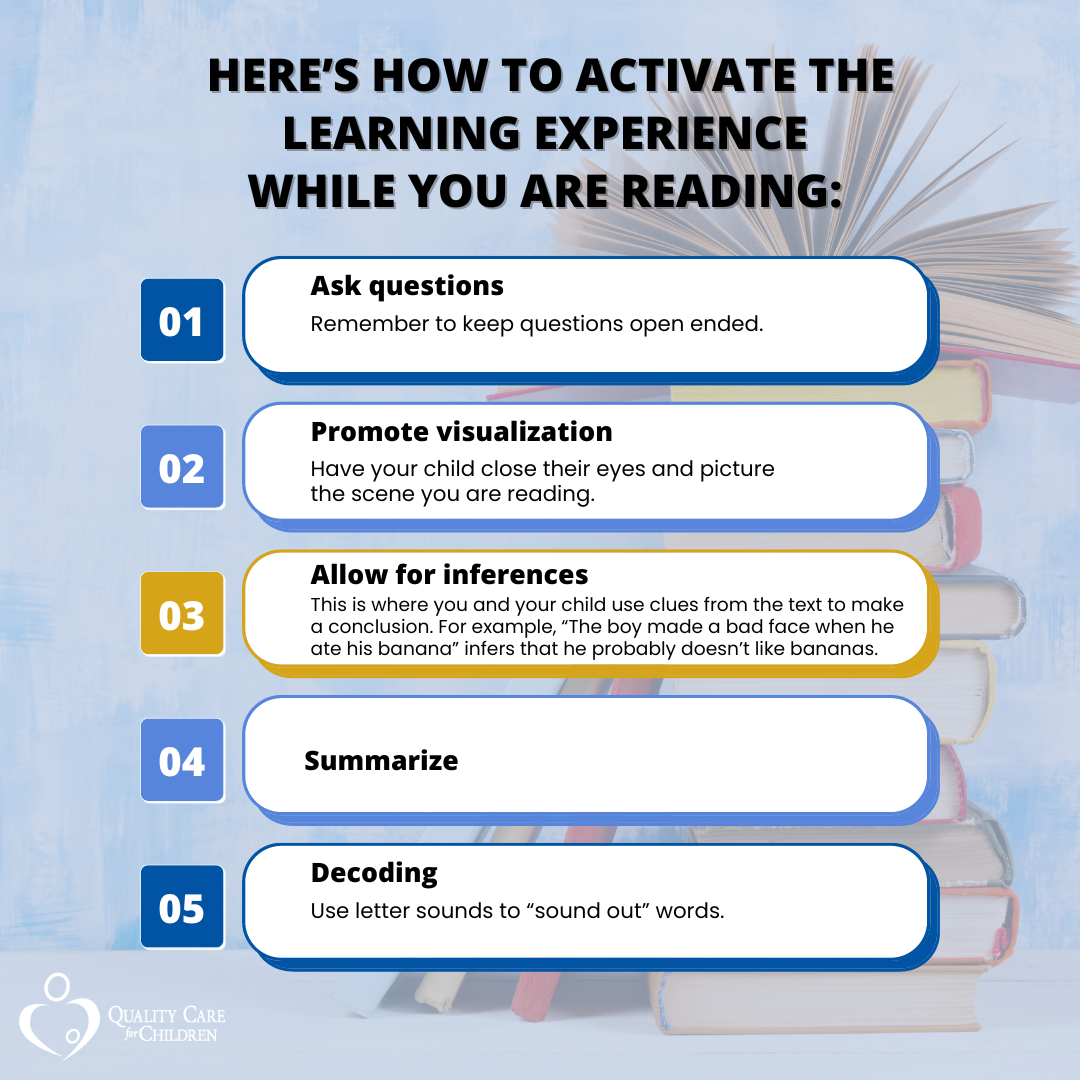Plan to Include Early Literacy and Language Development in Your Summer Fun!
Guest article by Angela Melton, ED.S
Vice President, Early Care and Learning for Quality Care for Children
Summertime has arrived and children are thrilled for all that will come in the upcoming weeks. During these months, children will stay at their child care program, join a summer camp, or enjoy time at home. While summer months are often more relaxed, it does not mean that learning stops. Families will have dynamic opportunities to cultivate summer activities for playing and learning!
Building early literacy and language skills in young children occur through simple activities such as reading a book, playing, walking and talking, singing together, and countless other activities. While there are many ways language and literacy are embedded into the day of a child organically, we must also be intentional in those efforts.
For instance, have you listened to a young child speak and thought their vocabulary was expansive for their age? Did you wonder why? It’s because a child with a broad vocabulary is exposed to a strong “language environment.” What can you do to support a rich language environment at home? Use the same methods with your child that early learning and care providers do in their classrooms!
We know that one way to expand the vocabulary of your child is through exposure to language. Give your child the background sound of language: allow them to hear conversations in the home, music playing, reading aloud (anything and everything), and engage them in direct conversations. Ask your child open-ended questions instead of closed-end questions. Don’t ask, “What color did you paint the flower?” Instead ask, “I see you painted the flower pink. Why did you decide to paint the flower pink instead of yellow?“ You want to seek answers that cannot receive a yes or no or singular word response. Questions and responses become the seeds for further dialogue.
Reading is another way to expand vocabulary. A strategy you should incorporate into your reading time is completing a picture walk before actually reading the book. This means looking at the pictures in the book to preview the story and create excitement for it prior to reading the text. Your homework beforehand will be to identify any words to preview before you read the book. As you read the book, use inflection and be engaging.
Here’s how to activate the learning experience while you are reading:
There are many additional skills that can be embedded while you are reading. Please remember, it is not necessary to incorporate all skills into a single reading experience and be mindful of what is developmentally appropriate.
Dramatic play for children is a fun and valuable activity that also supports their development in early literacy and language. Often children pretend to be a parent, a firefighter, doctor, cashier, mermaid, princess, construction worker, teacher, or whatever catches their imagination that moment. This form of learning play is high-level play because they are assuming the role of a character and taking on the characteristics of that role. As they perform in their role, they engage in conversation as their character. Their character is often an adult; therefore, you may hear them use vocabulary from their character. When playing or talking with them when they are in this role, you should match the vocabulary that is being used and enjoy the conversation! Dramatic play allows for so many skills to be used while children are using their imagination and being creative. Support this kind of play by keeping a container of old clothes, shoes, purses, and other accessories and materials in a container they can easily access.
In the summer, the days may seem extra long and it can be overwhelming to think of ideas to keep children engaged beyond a few days. Don’t worry! It is not as scary as you think. The key is to listen to your child. Below are other suggestions on how to make learning activities more welcome and how you can incorporate literacy and language support into your day.
Tips for Great Learning Experiences:
Explain the experience, as age appropriate.
Provide choices while playing and learning.
Allow your child to decide when the experience is over.
Give your child decision-making opportunities.
What are Some Learning Experiences?
Use whip cream to create letters and build words on a baking sheet or glass top.
Collect flowers, leaves, or rocks from outside. Use a magnifying glass to look at each item.
Use language to describe items.
Sort all items.
Paint letters and numbers on rocks to use all summer for various activities.
Walk in your neighborhood and play “I Spy with My Little Eye.”
Put a twist to the game by sharing funny stories about all items that are seen.
Participate in reading experiences at the local library and bookstores.
Create a book, as age appropriate.
Learn more here:


